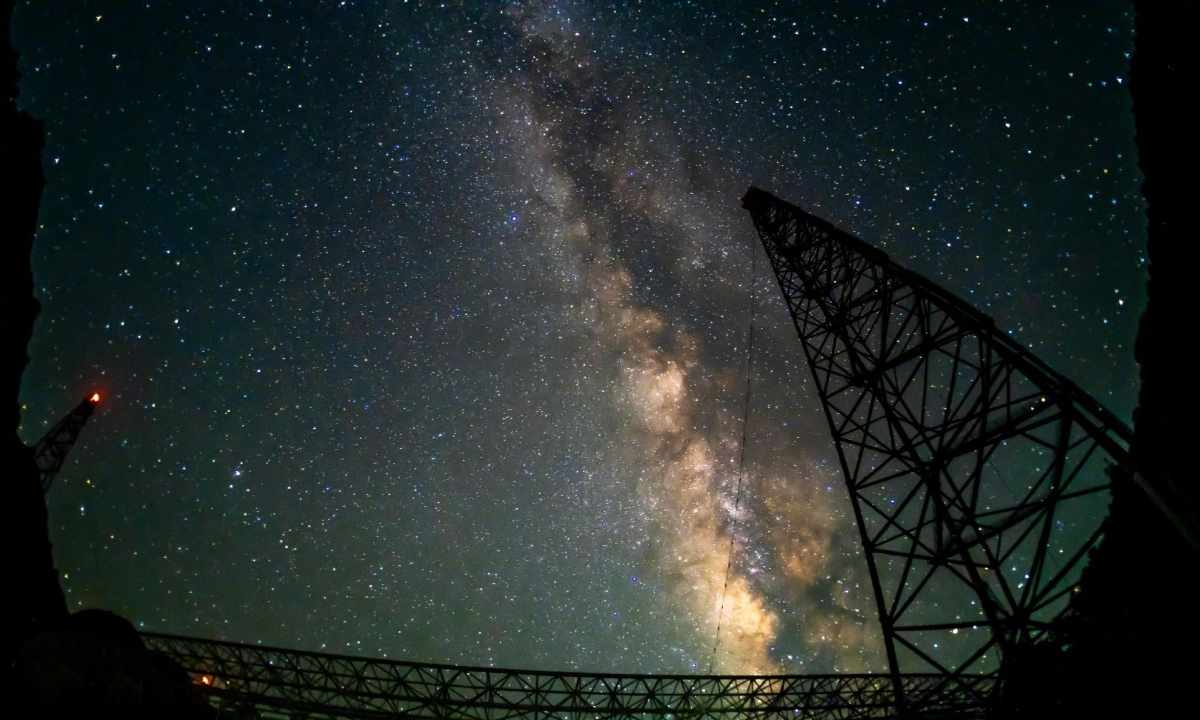Qinghai approves China's first regulation to protect dark sky reserve as province builds world-class astro-observation site

Photo:Xinhua
Authorities in Northwest China's Qinghai Province on Thursday approved the country's first local regulation to protect a dark sky reserve in Lenghu, where the province is building a world-class astro-observation site.
According to media reports, the regulation will take effect from January 1, 2023. It divides the astro-observation site in Lenghu into a core dark sky reserve and a buffer area to the dark sky reserve in order to protect the optical observation environment at night in Lenghu.
According to the regulation, in the core dark sky reserve, the type and brightness of light sources will be strictly controlled, and the illumination direction of all outdoor fixed night lighting facilities should be 30 degrees below the horizontal line. Construction of projects that affect the local astronomical observation environment and activities that affect the astronomical observation environment will all be prohibited in the reserve, media reported.
In the buffer area, the irradiation direction of all outdoor fixed night lighting facilities should be kept below the horizontal line, according to media reports.
The establishment of the astro-observation site in Lenghu, Qinghai, was announced in August 2021 after three years of monitoring and testing conducted by a Chinese research team led by Deng Licai from the National Astronomical Observatories of China (NAOC) of the Chinese Academy of Sciences (CAS).
The Qinghai government has been supporting the team's research since 2018. The regulation passed on Thursday is the latest effort to support the establishment of the site.
According to a statement by NAOC previously sent to the Global Times, the establishment of the site in Lenghu offers a major development opportunity for the country's optical astronomy, and will provide a valuable strategic resource for global development of this field.
The Lenghu area on Saishiteng Mountain is an ideal location to build an astronomical observatory, Deng told media.
He noted that this area in Lenghu Town, Mangya City, enjoys the advantages of clear night skies, stable atmospheric conditions, and a dry climate, offering great potential to become one of the world's best observatory sites. Deng had called on protective measures to avoid damaging local optical observation conditions after finding the site.
According to the Xinhua News Agency, a total of nine optical astronomical telescope projects have been settled in Lenghu, with an investment of nearly 2 billion yuan ($310 million).
Tian Cairang, an official with the Lenghu industrial park, was quoted as saying by Xinhua that several astronomical telescope projects have been launched at the Lenghu astronomical observatory base. Among them is the 50-centimeter Binocular Network (50BiN) project, implemented by the China West Normal University and officially put into use in December 2020.
The civil construction and main body of four projects have been completed with a total investment of 411 million yuan, said Tian. These include the Wide Field Survey Telescope (WFST) project, the Stellar Observations Network Group (SONG) project, the Infrared System for the Accurate Measurement of Solar Magnetic Field (AIMS) project, and the multi-application survey telescope array (MASTA) project.
The construction of the Time Domain Observatory (TIDO) project and the Multiplexed Survey Telescope (MUST) project would start in Lenghu, Xinhua reported in March.
The 6.5-meter MUST, developed by the Tsinghua University, will be the largest telescope in Lenghu upon completion. It is expected to help scientists make breakthroughs in the fields of dark energy evolution, gravitational wave cosmology, and galaxy formation.
Global Times

